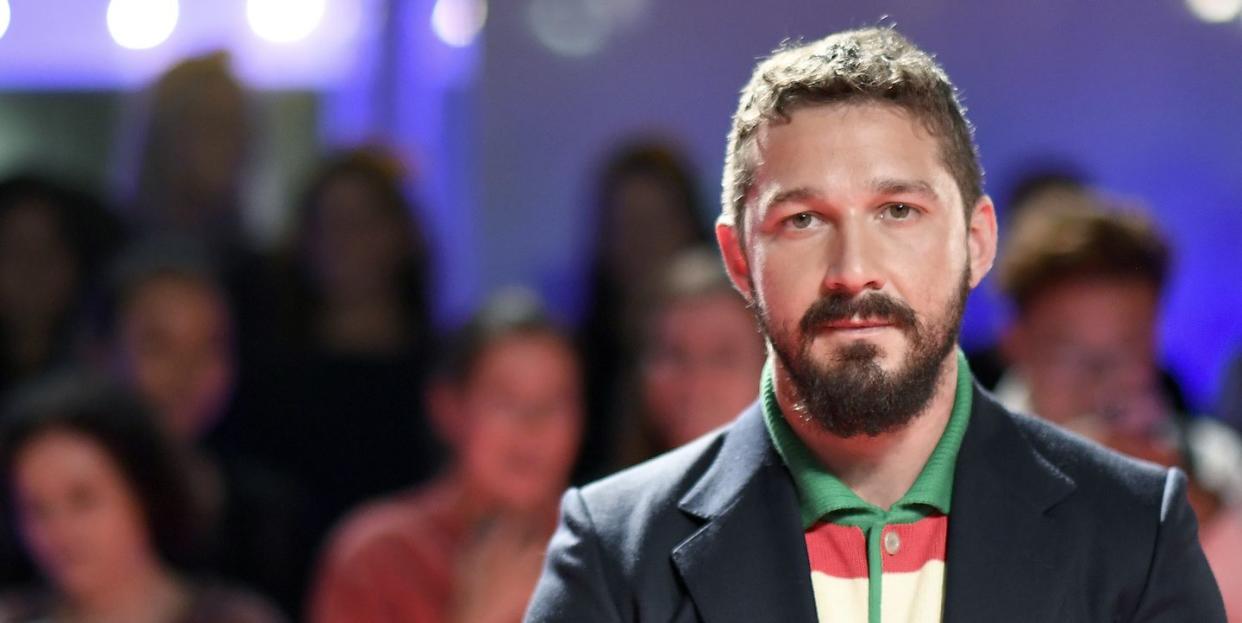Look, I Saw Shia LaBeouf’s Autobiographical Movie, ‘Honey Boy,’ and I Am Now in Love With Him

When I first heard about the plan for Shia LaBeouf’s new movie, Honey Boy, I’ll admit I was skeptical. Here’s the gist: Shia wrote the movie while in rehab, and it explores the relationship he had with his dad growing up. It’s technically “semi-autobiographical,” meaning the main character in the film is named Otis, not Shia, but it’s based on his IRL experiences. Instead of playing himself, though, Shia plays his dad, James, and the Otis character is played by Noah Jupe (young Otis) and Lucas Hedges (older Otis).
The setup is kinda confusing, but my reservations were mostly about how a person could give an honest portrayal of their own life when they’ve made plenty of mistakes along the way. Like, could Shia simultaneously play his dad and also own up to his own bullshit? I was more than ready for a Shia renaissance, but I wasn’t sure if he could tell his story in a way that felt true and also unbiased.
The story is split between Otis’s childhood, when he and his dad are living in a motel as the former pursues acting, and a time in his mid-20s, when he’s in rehab. The childhood portions reveal the abusive relationship the two of them have. Otis’s dad is a recovering addict, and Otis pays him to be his on-set supervisor.
You watch James hit on female crew members, verbally abuse Otis, and also prevent him from getting close to any other adults who could be positive influences on his life (even his mother). In one particularly crushing scene, James asks Otis, through tears, “How do you think it feels to have my son paying me? How do you think that feels?” And Otis replies, “You wouldn’t be here if I didn’t pay you.”
That last line of the #HoneyBoy trailer tho… Link in bio.
A post shared by Honey Boy (@honeyboymovie) on Aug 20, 2019 at 5:05pm PDT
The movie makes you physically ache for bb Otis, who’s trying to build a career for himself while also keeping his dad afloat. But the real power of this movie is in Shia’s performance as James. As a viewer, you fully expect to hate the guy. He’s so mean to his own kid, who’s only trying to earn his love.
But as the movie unfolds, you learn James is the way he is for a reason (as we all are). He’s a man struggling with his own failures and he takes that out on everyone around him. Shia plays the character with such empathy that you end up feeling devastated for both of them.
Before seeing this movie, I remembered Shia as a child actor who got really famous really fast, was amazing in a few Transformers movies, and then went off the rails as an adult. But it’s easy to forget that for every child actor, there’s probably a bunch of people using that kid for their own gain. The damage from that doesn’t go away when you turn 18.
Watching Shia examine his own life through this lens shows that he’s not only ready to atone for his own mistakes but also explore what made him do those things. It’s not like the movie is a blanket apology for everything he’s ever done, and this is not to say that having a rough childhood gives you free license to be problematic as an adult. But you can tell he is trying to wrestle with some very traumatizing moments and examine how those led him to where he is now.
It takes a certain level of maturity to be able to look at the person who had a hand in messing you up and think of them in a sympathetic way and then communicate that to the rest of the world. The Shiassance is officially upon us, people, and I’m more than ready.
You Might Also Like

